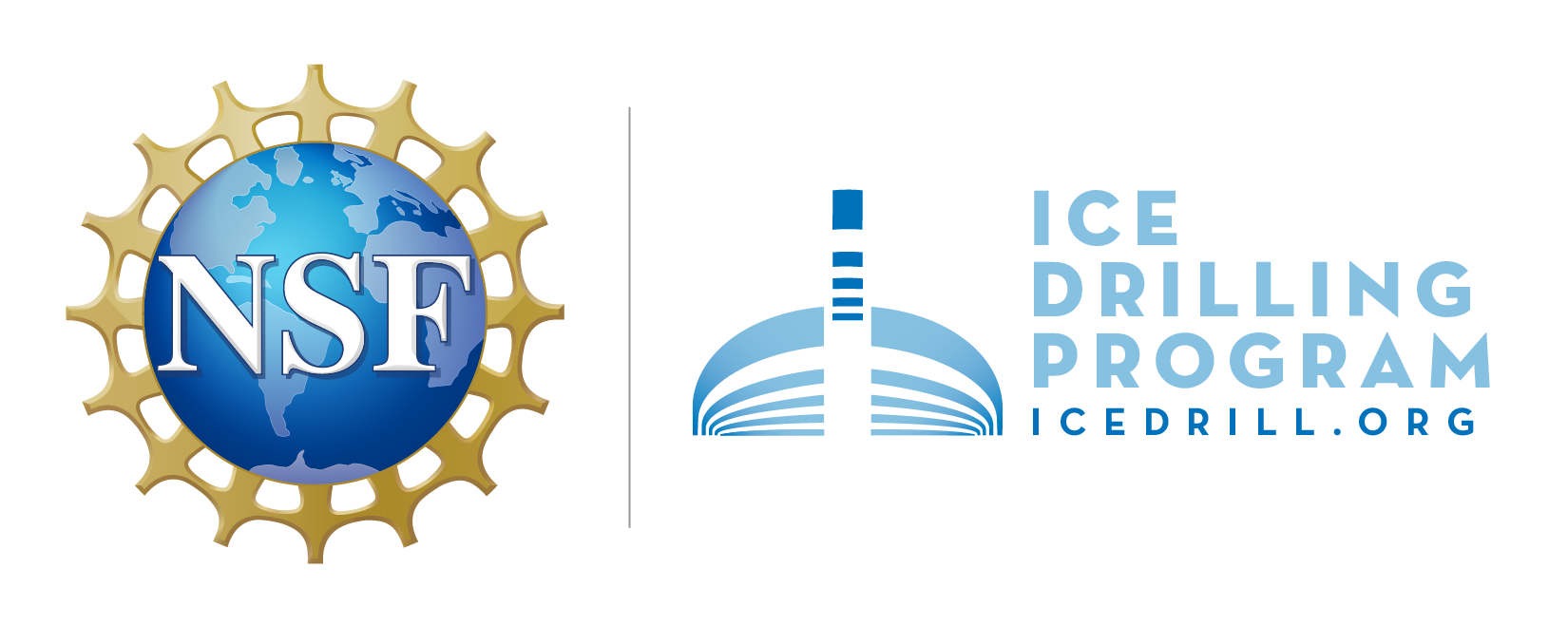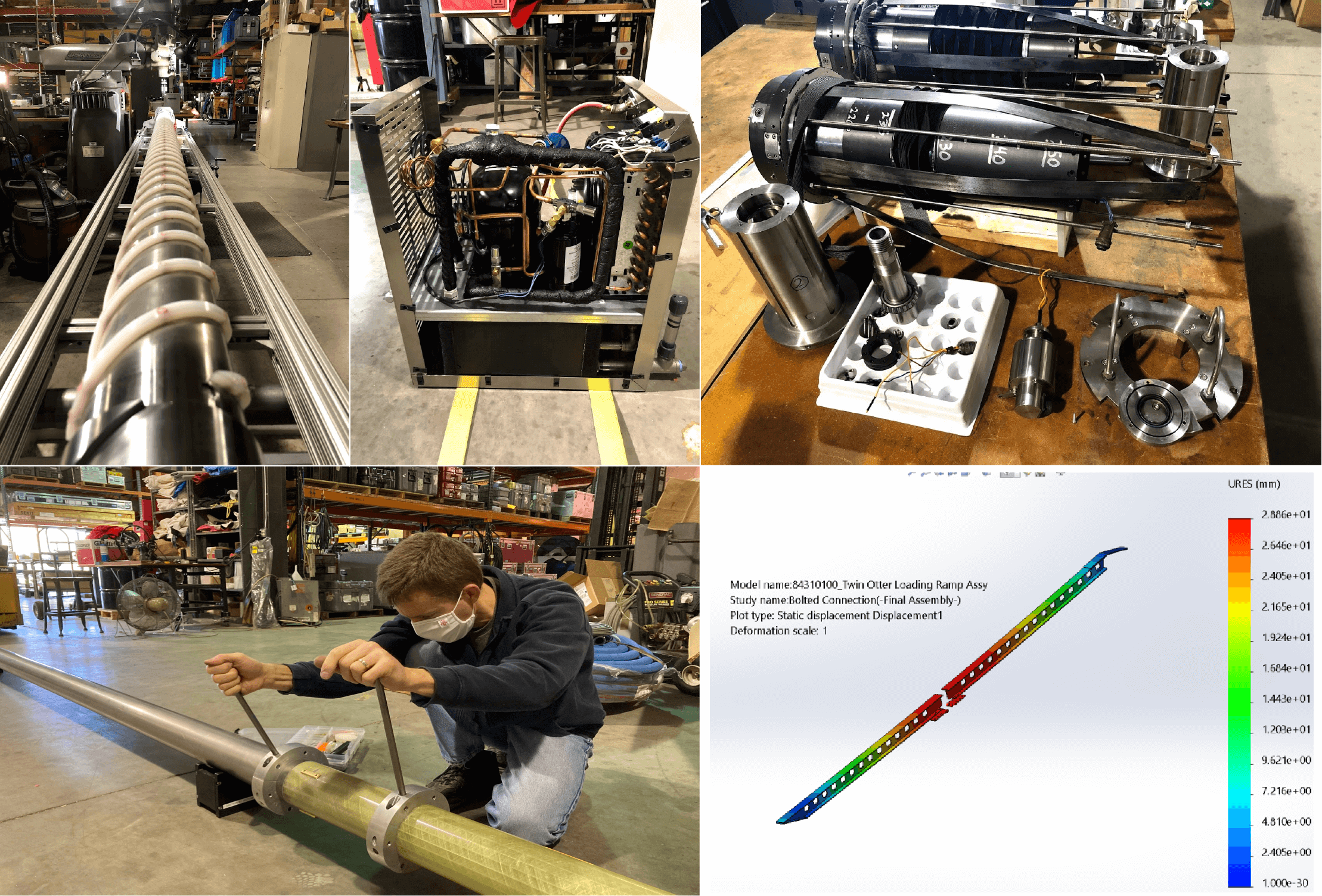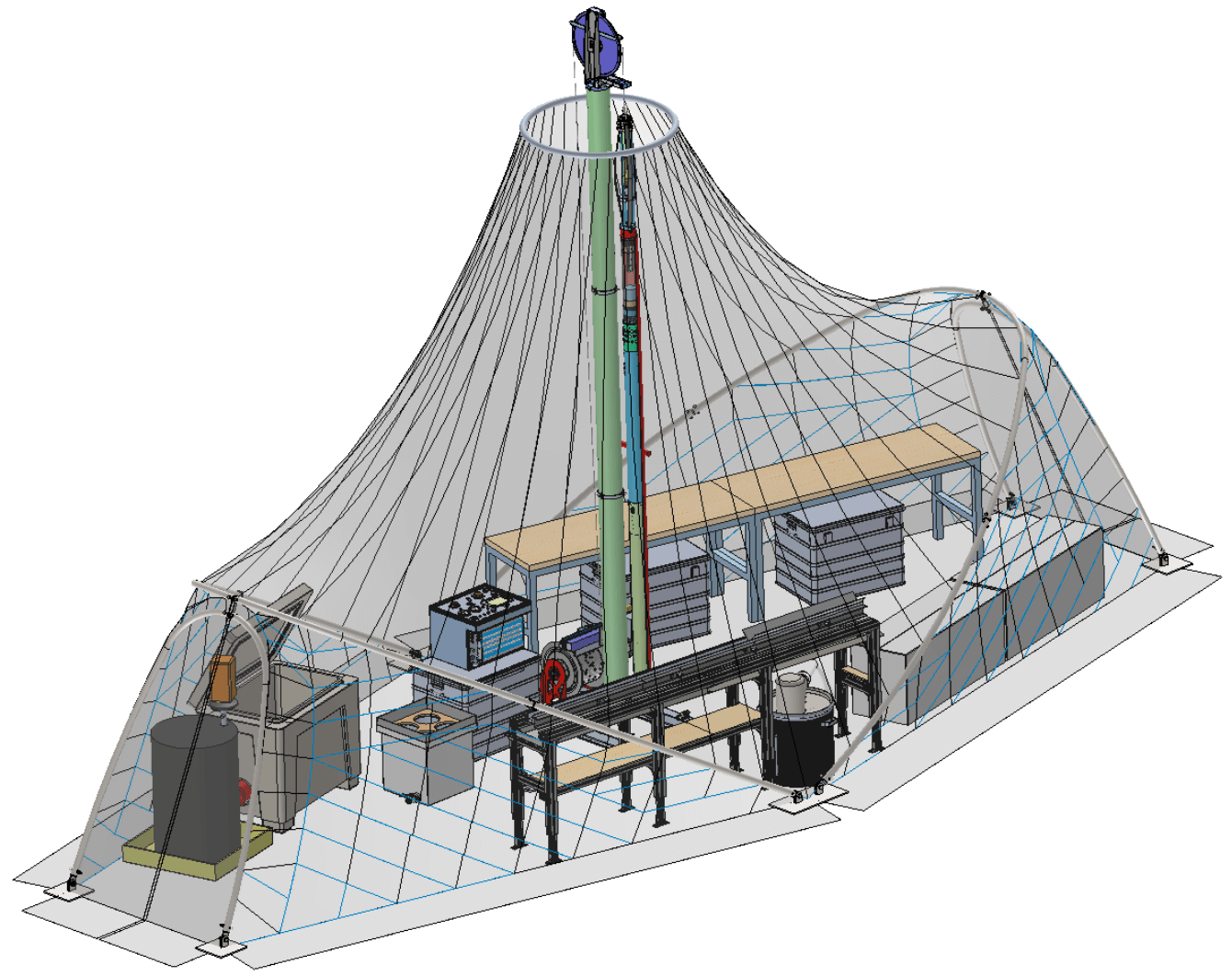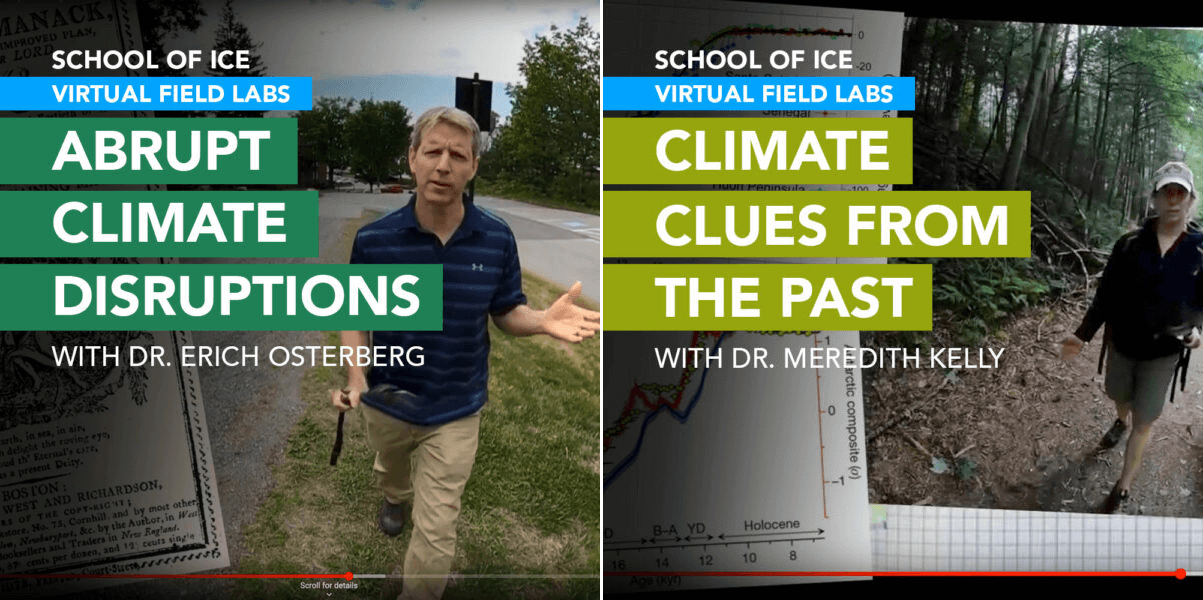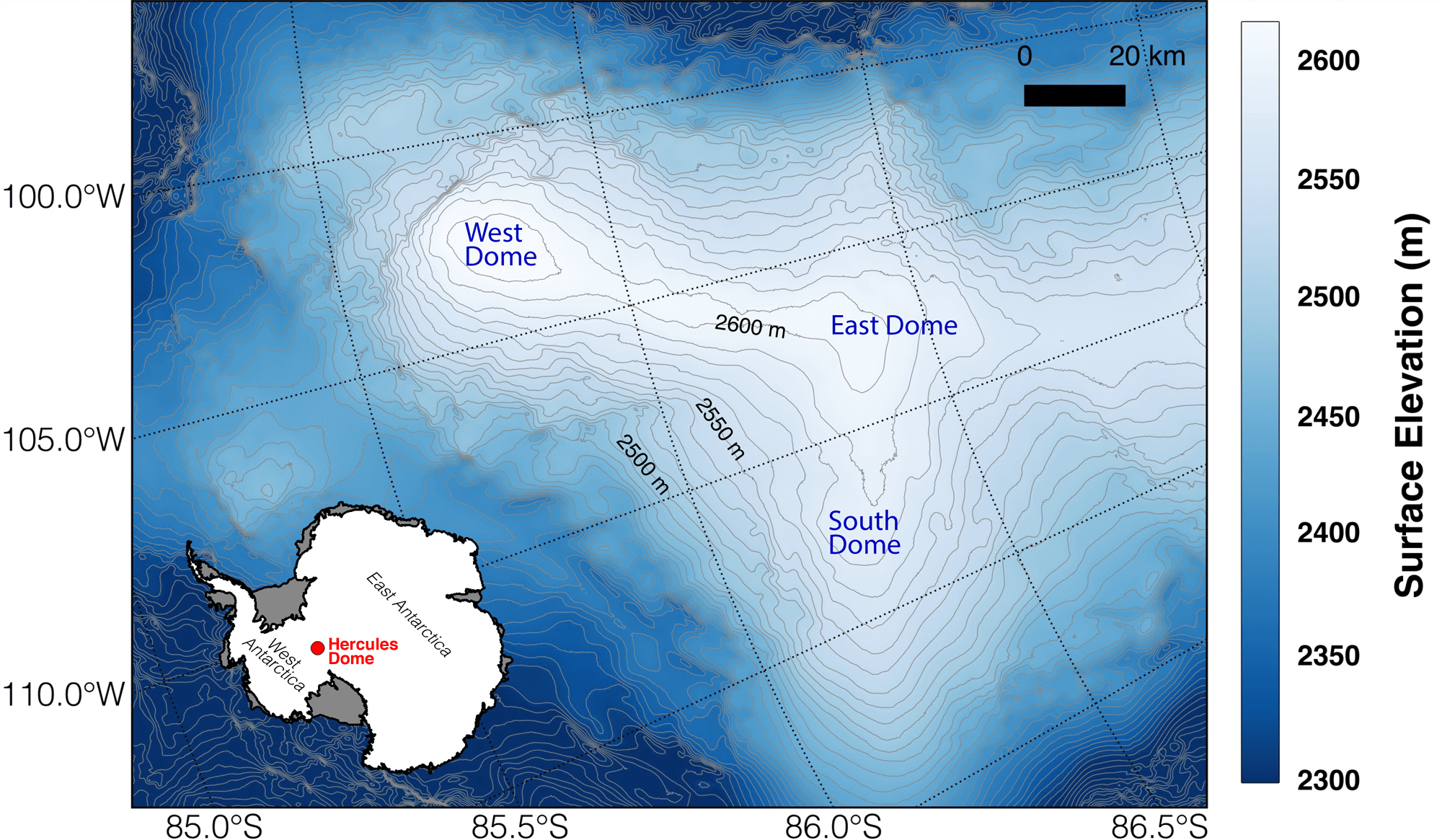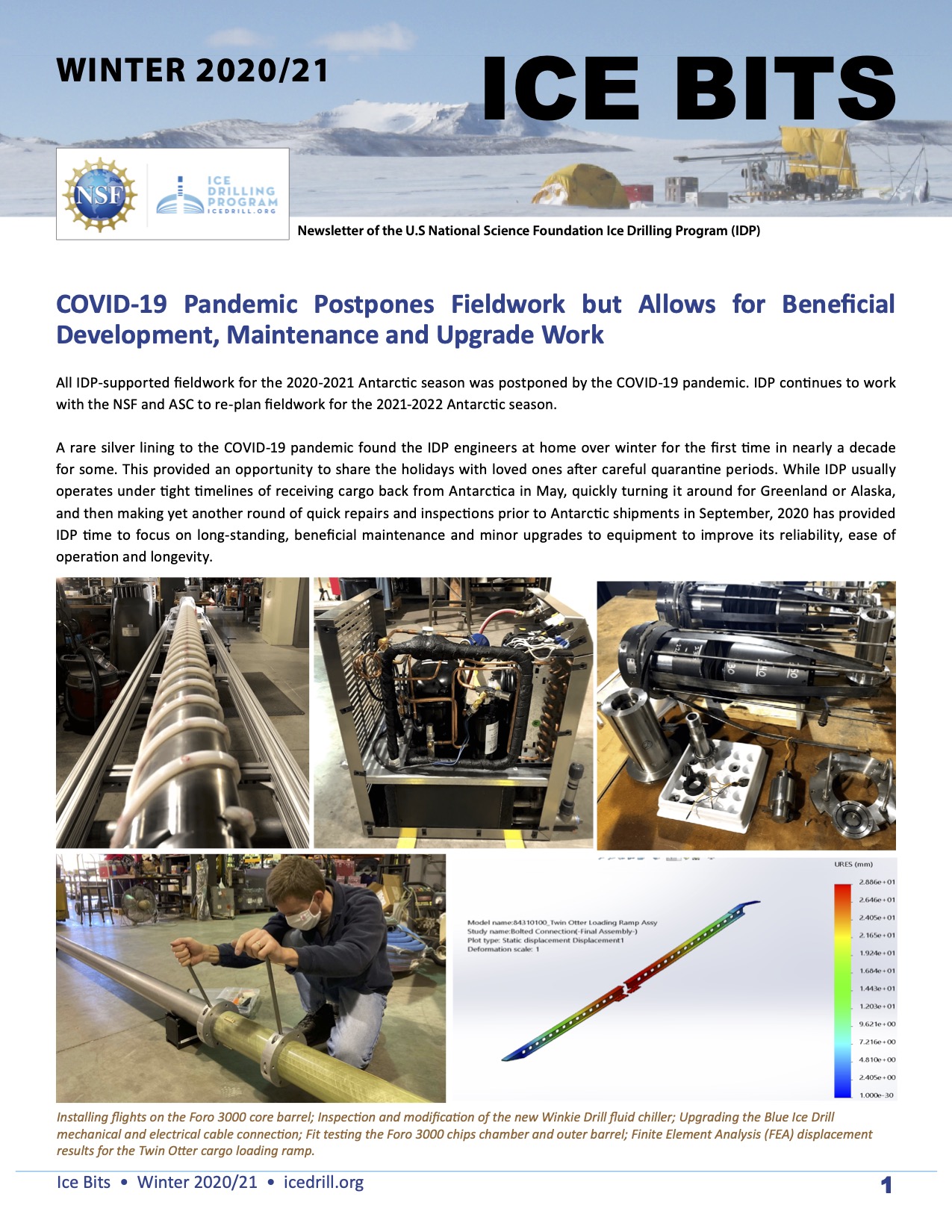COVID-19 Pandemic Postpones Fieldwork but Allows for Beneficial Development, Maintenance and Upgrade Work
- Fieldwork
All IDP-supported fieldwork for the 2020-2021 Antarctic season was postponed by the COVID-19 pandemic. IDP continues to work with the NSF and ASC to re-plan fieldwork for the 2021-2022 Antarctic season.
A rare silver lining to the COVID-19 pandemic found the IDP engineers at home over winter for the first time in nearly a decade for some. This provided an opportunity to share the holidays with loved ones after careful quarantine periods. While IDP usually operates under tight timelines of receiving cargo back from Antarctica in May, quickly turning it around for Greenland or Alaska, and then making yet another round of quick repairs and inspections prior to Antarctic shipments in September, 2020 has provided IDP time to focus on long-standing, beneficial maintenance and minor upgrades to equipment to improve its reliability, ease of operation and longevity.
700 Drill
- 700 Drill
The IDP Science Advisory Board identified in the IDP Long Range Science Plan 2015-2025, and later, a priority need to alter the surface equipment for the existing Foro 1650 (Intermediate Depth Drill) to make a drilling operation that is less logistically intensive, to be used for alpine or polar ice coring at sites with limited logistics and with two months or less time on site. In continuing discussions, it became evident that a smaller diameter core would result in significant logistical savings. From discussions organized by IDP with iterative discussions between scientists, and IDP staff, the 700 Drill science requirements were finalized, and a Conceptual Design Review was also completed. The proposed 700 Drill system design is guided by and meets the science requirements identified by the research community. The system will be optimized to have minimal logistical requirements for drilling projects up to 700 meters depth. The proposed 700 Drill system will produce the smallest core diameter (70 mm initially, potentially adapting to 64 mm in the future) and borehole diameter (88 mm) of the IDP suite of drills, which will minimize the quantity (i.e., volume and weight) of drilling fluid and the number and weight of core boxes. Pending NSF approval, IDP will move forward with the Detailed Design phase for the 700 Drill and, when completed, will present the design to community scientists and NSF for review.
Innovative Virtual Field Labs Offer New Participatory Experiences for Online Learning
- Education/ Outreach
Virtual Field Labs are unique interactive Education & Outreach products of the US Ice Drilling Program designed for students from late middle school to college. Virtual Field Labs are designed for students to watch with a teacher present (virtually or in-person) or independently on their own computers. Each Virtual Field Lab takes students along with a climate scientist as they collect and analyze data to answer a different climate question. Virtual Field Labs are designed to engage students in active note-taking, building data tables, sketching, graphing, calculating, and analyzing. Active participation will produce student artifacts designed to be easily checked by the teacher, and Next Generation Science Standards (NGSS) are emphasized throughout each lab. Two Virtual Field Labs are available now, and a third lab is coming soon. For more information, visit the Virtual Field Labs webpage.
School of Ice 2021
- Education/ Outreach
- Meetings/ Workshops
The School of Ice (SOI) is IDP’s successful advanced professional development workshop on ice core science for college faculty and high school teachers who teach advanced science courses. Planning for the SOI 2021 is underway. This year, the SOI will be held at Oregon State University from July 31-August 4, 2021. In case COVID-19 continues to make in-person workshops impossible, the SOI will be held as a virtual workshop on the same dates with the same speakers. Applications to attend the SOI are now being accepted. Please share the application link with eligible colleagues. For more information, including eligibility requirements, visit the SOI webpage.
IDP Science Advisory Board Meeting March 18-19, 2021 and Call for Input into the Long Range Science Plan
- Meetings/ Workshops
- Long Range Plans
- Science Advisory Board
The U.S. Ice Drilling Program (IDP) convenes a Science Advisory Board (SAB) to form and update the Long Range Science Plan that addresses multiple aspects of ice core and other ice science and associated technology. The members of the SAB are Jill Mikucki (SAB Chair; University of Tennessee), T.J. Fudge (University of Washington), Brent Goehring (Tulane University), Bess Koffman (Colby College), Erin Pettit (Oregon State University), Martin Truffer (University of Alaska Fairbanks), Trista Vick-Majors (Michigan Technological University), and Paul Winberry (Central Washington University). The next SAB meeting will be held in a virtual format on March 18-19, 2021. If you envision the need for ice drilling for your project in the coming decade, send several sentences describing the science driver and the anticipated field date and location for your project so that your plans are voiced in this planning document. Please email your input as soon as possible to any SAB members or the IDP via IceDrill@Dartmouth.edu. The 2020-2030 Long Range Science Plan is available at https://icedrill.org/long-range-science-plan.
Early Career Travel Grant Opportunity for the 2021 IPICS & ICYS meeting
- Meetings/ Workshops
The U.S. Ice Drilling Program (IDP) offers an NSF-sponsored opportunity for early career scientists, postdocs, and PhD students in the U.S. to apply for travel support to the October 2021 Ice Core Young Scientists (ICYS) and International Partnerships in Ice Core Sciences (IPICS) Open Science meeting in Crans-Montana, Switzerland. Applicants must be currently employed by a university or research institution within the U.S. Successful applicants will receive reimbursement toward their conference registration, air and ground travel, and lodging costs up to a maximum of $3,615 US; the exact amount will depend on the number of qualified applicants. Applicants must plan to attend both the IPICS and the ICYS meeting. Qualified applicants will receive confirmation of their maximum potential reimbursement amount from IDP by June 1, 2021. Reimbursement based on receipts will be issued soon after the meeting.
Applications will be accepted until April 30, 2021. To apply, create a single pdf document that contains the following information:
- A one-page brief CV that includes your name, current position, affiliation, contact information, education, and publications
- Listing of your estimated travel costs
- A one-page description of how you will contribute to the IPICS and the Ice Core Young Scientists meetings, and what you will do, within two months after the meetings, to use findings from the meetings in materials you will produce to inspire your students and your community in STEM science.
Please email your application to Icedrill@Dartmouth.edu before April 30, 2021, under the subject heading “Application for Early Career Travel”. Confirmation will be sent to awardees by June 1, 2021.
Hercules Dome Ice Core Project: Community Workshop and Webinar Events
- Meetings/ Workshops
- Fieldwork
The first community workshop and science planning meeting for the Hercules Dome ice core project will take place on May 10-11, 2021, using a virtual platform. This is both a planning meeting and an open science meeting, which will provide an opportunity to hear about some of the latest Antarctic ice core research, and to begin to develop new collaborations.
The Hercules Dome project is a major investment by the U.S. National Science Foundation (NSF), and represents a community platform for research, rather like an oceanographic cruise or a spacecraft mission. Hercules Dome follows in the long tradition of deep ice core projects supported by the NSF, including the GISP2 project in Greenland, the WAIS Divide project in West Antarctica, and the recently-completed South Pole (SPICEcore) project, all of which have led to substantial scientific advances.
Drilling at Hercules Dome is not expected to begin until 2024, at the earliest. This means that there is time to develop novel ideas, and to find ways to get involved in the project, whether through measurements on the ice core, modeling related to the ice and climate dynamics, meteorological observations in the field, innovative community engagement and education work, or other ideas.
In preparation for the meeting, the Hercules Dome lead team will be hosting two informational webinars on March 23 at 1:00 p.m and March 31 at 9:00 a.m. (both Pacific time) that will include Q&A sessions. The goal of these webinars is to provide more background on the project and answer questions that will enable interested participants to contribute more fully to the meeting in May. The webinars will have the same content, but will provide two different opportunities for participation. To register for one of the webinars, use one of the following links:
On April 15, there will be a special webinar lecture given by Eric Wolff of Cambridge University, “New frontiers in Antarctic ice core research”.
The May meeting will include a small number of invited speakers and substantial opportunities for participants to present their ideas and to network with others involved in Antarctic glaciological research, including, but not limited to, ice core science. Those working on the communication of polar science are also strongly encouraged to attend. Registration for the April 15 lecture and the May meeting will be on the Hercules Dome website soon.
If you are interested in these events, mark your calendars and sign up for the Hercules Dome listserv (https://herculesdome.org/get-involved) to stay informed.
ICYS International Ice Core Seminar Series
- Meetings/ Workshops
Ice Core Young Scientists (ICYS) is an informal, international network of early-career scientists dedicated to studying polar and alpine ice cores and ice core-related sciences. ICYS is holding a new international ice-core seminar series, supported by the International Partnerships in Ice Core Sciences. The monthly seminar series consists of two talks – one from a senior researcher, followed by an early-career researcher (ECR) in a similar research theme. The organizers hope that this will be a good way to bring together international ice-core-related research. The series aims to provide much-needed scientific interactions between researchers at all stages in their careers, especially given the cancellation of in-person conferences at this time.
Upcoming program
The second seminar will be held on March 25 from 20:00-21:00 UTC.
Senior researcher: Brad Markle
ECR: Romilly Harris Stuart
How to join
To receive the Zoom link for the seminar, send an email to icecoreys@gmail.com, with the subject line “Seminar”. The Zoom link will be emailed to you ~24 hours before the start of the seminar.
Interested in presenting?
Anyone interested in presenting their work should contact the organizers: icecoreys@gmail.com
Past seminars
Past seminars are available for viewing at http://pastglobalchanges.org/science/end-aff/icys .
Acknowledgment of IDP in Publications
- Publications
If you receive any support from IDP, we kindly request that you acknowledge IDP in any resultant publications or articles with the following statement: “We thank the U.S. Ice Drilling Program for support activities through NSF Cooperative Agreement 1836328.” If you have any questions, please contact us at IceDrill@Dartmouth.edu.
Ice Drilling Support for NSF Polar Proposals
- Fieldwork
- Funding Opportunities/ Solicitations
If you are preparing a National Science Foundation (NSF) proposal that includes any kind of support from IDP, you must include a Letter of Support from IDP in the proposal.
Researchers are asked to provide IDP with a detailed support request three weeks prior to the date the Letter of Support is required. Early submissions are strongly encouraged.
Although there are no proposal deadlines for the Antarctic Research and Arctic Research solicitations, NSF advises researchers to submit proposals 18 months in advance of their potential deployment date.
For further information on requesting IDP support, visit our website at
https://icedrill.org/requesting-field-support or contact us at IceDrill@Dartmouth.edu .
